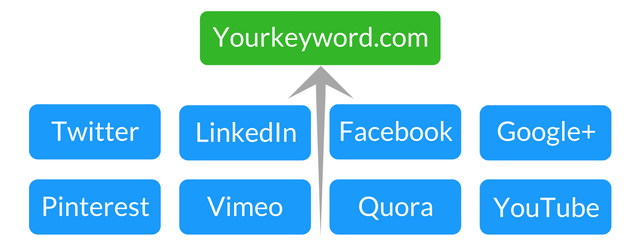Off-page Optimization 101
Summary: When optimizing your sites, profiles and content, off-page factors can have as much influence over your rankings in a search engine as on-page factors. Here's what you need to know:
What is off-page optimization?
"Off-page optimization" refers to the ways that you can make your site more search engine friendly without touching its content or code.
Why is off-page optimization important?
This goes back to a fundamental principle of SEO. Webpages that are more popular, informative and relevant rank higher than their less popular counterparts.
Search engines identify sites that receive more inbound links, mentions, likes and shares on social media as being more popular and authoritative than those that do not.
Top 3 Off-Page Optimization Factors:
1) Link Architecture
The way that you choose to interlink your own websites and profiles together can signal that they are relevant to you. By connecting certain social media profiles to your website or each other, you are showing their relationship. However, it doesn't necessarily make sense to link all of your social media profiles together, (learn more about that in our guide, "Interlinking Your Sites & Profiles"). Instead, it should be organic.
For example, if you are a real estate agent, it makes more sense to link your professional website to your YouTube channel >>(which shows tours of current listings), than to your private Pinterest account (which consists of 100 lasagna recipes and 5 different haircuts you've considered getting over the past 18 months).
As you continue to develop your online profile, you may change your link structure depending on your needs, and fluctuations in search results for your name.
At BrandYourself, we traditionally start with a link structure (as visualized below), that includes social media properties that link back to the client's personal website.
Sample Link Structure

2) Authoritative Inbound Links to Your Site
When it comes to inbound links, you want to earn as many AUTHORITATIVE links to your website as you possibly can. Each one acts as a vote that your site should rank higher. Sites that are considered "authoritative" are already popular and essentially carry a certain amount of clout in the world of search engines. Linking to your personal website from social media profiles that you control is one way to earn authoritative inbound links.
However, well-known bloggers, news sites, academic journals and other highly regarded sources can also provide valuable inbound links to your site. Start the process by linking back to your website in your professional profiles. From here you should plan to develop a strategy to earn high-quality inbound links from authoritative sites (that you don't control) over time.
3) Organic Social Media Engagement
While we don't know how much of a site's ranking is due to related social media engagement, we do know that it definitely plays a part. With that in mind, it's up to you to try and earn as much organic social engagement as you can. Engaging on social media platforms not only provides you with a chance to interact directly with colleagues, partners and clients, but from an SEO perspective, it shows that your site and profiles are relevant.
When talking about "organic social media engagement", we are referring to ways that you can build and interact with communities on different social media platforms without paying that social media platform any money. This means that the quality of your content and your ability to really connect with other users and user communities in an authentic way is of utmost importance. Use these platforms as a way to interact with consumers, clients or partners who are active on social media and care about what you have to say because it's relevant to them.
Remember, off-page optimization is an important factor in creating a visible personal online brand. We will continue to delve into these factors in coming guides.
Interlinking Your Site & Profiles →